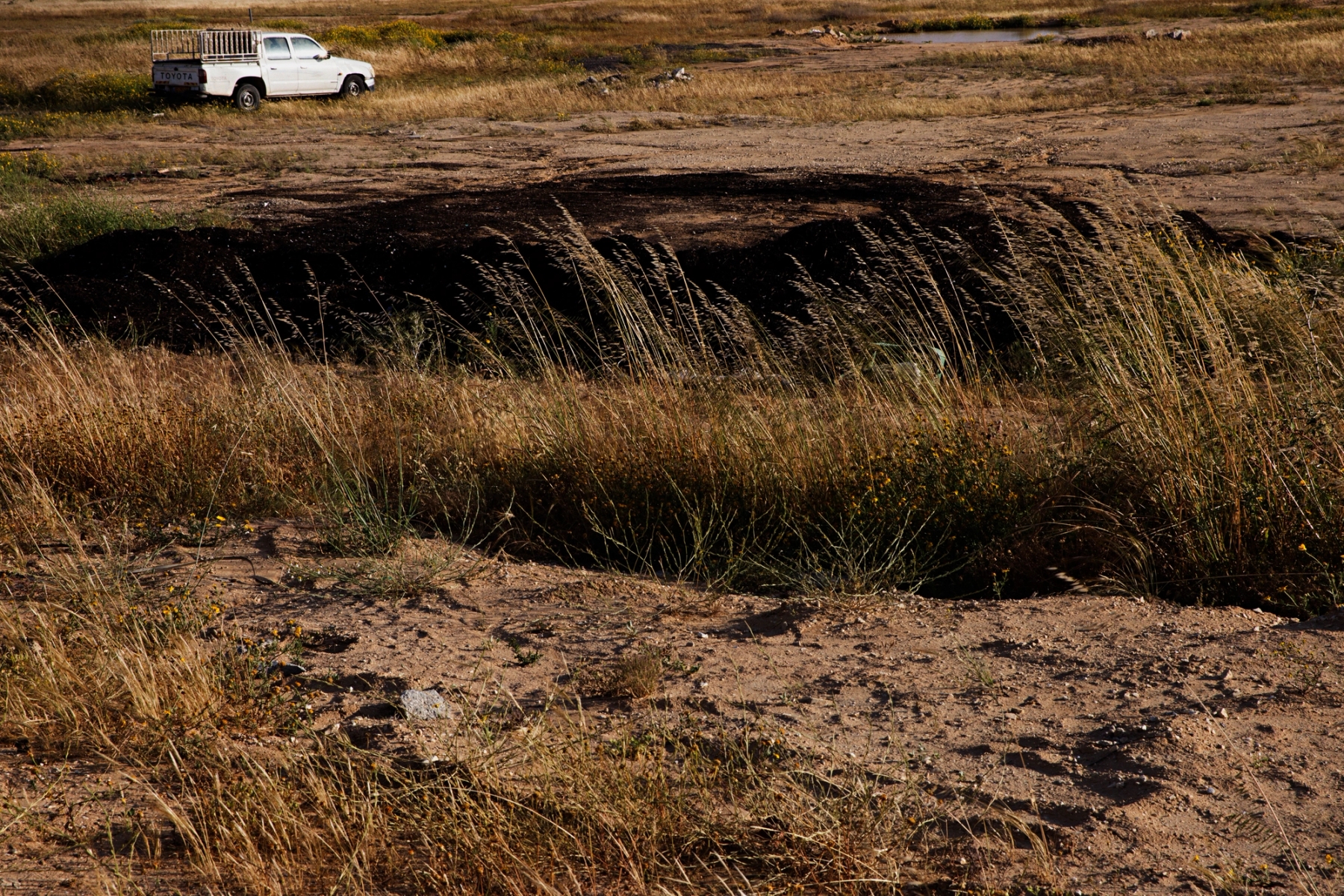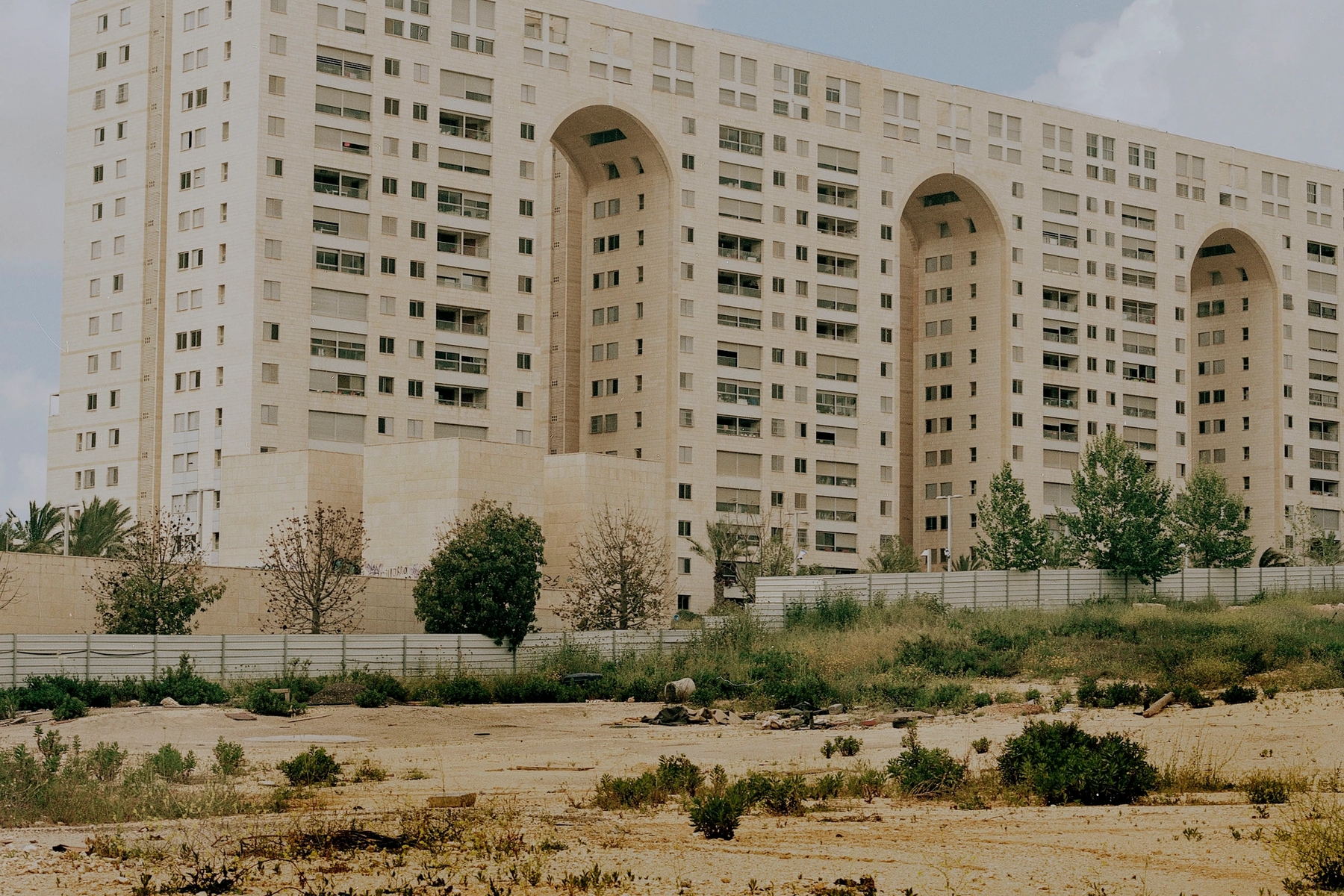Landing by Luna Conte, in conversation with Svetal Chassol
PHOTOGRAPHY Luna Conte
INTERVIEW Svetal Chassol
Luna Conte is an ECAL graduate, with a strong interest in memory through the lens of territory. After her first trip to Israel years ago, she decided to go back to this land—to which she has no direct link—to try to cut through its mystery and phantasmal wall; through its frontiers and boundaries—visible or not. We discussed the origins of her work, Israel and its accessibility, its permanent tension, and her vision of its complex historical territory.




Tell me about you.
I went to L’ECAL and studied there. I was drawn towards images that were editorials and fashion, more commercial stuff. But this project about Israel came quite early. I’m not Jewish, but my father’s wife is; so it’s kind of always been part of my life. That was way before leaving Paris for Switzerland. The way she told me about Israel has always been very positive, she always told me about how unique and wonderful it was. But I had no idea of how it really was: my first trip to Israel was 3 years ago, and it was completely different from what I had in mind. You kind of know where you’re going, but when you’re actually there, the atmosphere was different from what I imagined. So when I came back from that first trip, I made a short film out of what I had filmed there.






What was it about?
It focused on geopolitical issues. I spent a few weeks in what people call "the occupied" territories, but I thought it wasn't that interesting because the way I filmed them was a bit too naive. Long story short, I came back and the idea of doing something about Israel stayed on my mind. It made sense, of course, because of my family: my step mother; but also because of the person I went with when I first arrived. This person made me meet someone. That someone was a Holocaust survivor, who has now since passed away. He was there and participated in the the construction of the state of Israel. I found him fascinating. So the main interest of doing a film kind of came out of that, I started reading a lot about it. It’s still tough for me to position myself in the whole thing, even though I kind of know where I stand personally. And, then, came my third year at l’ECAL where we had to present a memoire and I was quite focused on the link between memory and land and how it's transcribed and restored through images. From this, I basically wrote on the images that I had filmed two years prior, in a narrative way. Later on, I had my diploma project and thought about it a lot as I wanted to do it about Israel again, but I felt like it would be a bit tricky: as I had nothing to do with this land directly. I still decided to go there for two months, this time by myself. That’s when I made this project.





When was this?
One year ago, during March and April.
I went there with a precise idea in mind: I knew where I wanted to go, who I wanted to meet, my whole itinerary, but you know, until you’re there you never really know how it'll go. It ended up being quite crazy and intense.
Why?
It was the first time going by myself. My itinerary was specific, I wanted to meet all sorts of people—young girls going to the army, other young girls who were trying to run away from it. But also architects; and other diverse characters. I was staying in Tel Aviv while I was there, but you know, Tel Aviv is a bubble inside Israel. As soon as you come out, you get hit with the reality there. It wasn't easy, not only as a photographer, but as a foreigner in general. People would also check on me, they would check if my tripod was not a weapon. I had to justify all my moves.





How would you do so?
I would try to appease them. I told them that I was a student and that I was doing a school project. Wth most of the people that I'd met there, I'd spoken with them about the film quite extensively and presented it to them so they could be reassured. So yeah, it was quite intense, because you never feel like home. That was one of my main worries. I kept asking myself if it was legitimate enough for me to do something about a place without being from there. Do I want to do something that would be quite activist? Something that would partial? But no, that was not my goal. What was most important for me was to talk about Israel in a way that would be to bring a vision that would be completely subjective but true to me in the best way possible.


The first thing that struck me was the accessibility of the project. How did you gain access to this, and what made you want to gain access so much to something that is not easily accessible? If that makes sense.
Like I said, I had certain ties to it that pushed me to go, but I think mostly it's the fact that it's a challenge. I think it was risky, but I was curious to see how I could talk about it; how I could manage to talk about it. It resonates with so many things already, so many clichés and ideas. I felt that the fact that I had no direct link with this land was also interesting, I approached it with my own personal interpretation and I felt like it was not forbidden to be interested in things that are not so close to us. I was probably also quite fascinated. But I did have some ties to it; my stepmother, relatives that endured the Holocaust—all of this touches you. So you kind of want to know more…


Before my first visit there, Israel had existed for me only through their stories and their own memories.

So, what was your stepmother saying to spark your interest?
I think, like a lot of Jewish people that I know, she hyped it up a lot. She would tell me: “You’ll see, Israel is amazing, you will feel like home, it’s our home. There’s a great history, you need to go. People are so nice.” But it was mostly surface talk, it was quite superficial as it would not explain why exactly it was so great. So that’s why my first idea was so idealized.


Second thing that hit me was the fact by reading your text I could definitely tell that you were of the plurality of the land, but yet when looking at the pictures I kind of felt like it was missing some of it in it?
That’s not incorrect. What came out of the pictures when I got back is even though the plurality over there is enormous tensions contrary to popular belief, I didn’t want to exclude anyone but at the end, as you can see, I realized I shot mostly women and children. Especially Jewish-Israeli women and children. Also, it's tricky to talk about everything out of nowhere. I needed an angle, and I found that angle through what I was already doing before.

Because I always shot more women than men for multiple reasons. When I came back, I spoke about it a lot with my teachers. And I realized that actually women and children are the ones that are kind of left out of the Jewish-Arab conflict. Not that they don’t suffer from it, but the conflict, the war, is something that is quite masculinized. But I understand that you would ask yourself this question, the truth is, I honestly didn’t think about it priorly, at all. It’s definitely something I would do different when I go back, and I definitely plan to do so. I will definitely try to show more of the reality of this land.
I didn’t realize immediately that my vision of Israel was so idealized… Meeting those people helped me break that wall.


How long did it take for you to break that phantasmal wall?
I didn’t realize immediately that my vision of Israel was so idealized. I did when I first got out of Tel Aviv. When I was riding buses for 3 to 4 hours to go to small towns, and speaking with various people from different territories, people that looked the same but were quite different each other, people with divergent opinions and divergent views. Meeting those people helped me break that wall.










